
Artificial intelligence has emerged as a game-changer in the world of accounting, with a new breed of AI tools redefining how accountants approach their work. To stay competitive, embracing AI is no longer a choice, but a strategic necessity.
At the forefront of this revolution is ChatGPT, an AI language model developed by OpenAI. In 2023, ChatGPT became the fastest-growing application in history, smashing the 100-million-user milestone just a couple of months after its launch.
In this article, we’ll highlight 12 use cases for ChatGPT in accounting. We’ll explore how it can enhance accounting processes, optimize efficiency, and help you thrive in the modern accounting landscape.
What is ChatGPT?
ChatGPT is an AI tool designed to understand and generate text-based language in response to the input it receives. It combines natural language processing (NLP) and machine learning (ML) algorithms to engage in human-like conversations.
Unlike traditional chatbots, ChatGPT goes beyond pre-programmed responses and fixed scripts. It can learn from vast amounts of text data, adapt to a wide range of topics and contexts, and improve its performance over time. This allows ChatGPT to:
- Understand questions, prompts and statements from users
- Assume different roles and writing styles according to the prompts it receives
- Generate near-instant responses that are highly relevant
- Provide responses in the context of a broader ‘conversation’
12 ways to use ChatGPT in accounting
ChatGPT’s ability to deliver highly relevant and complex responses in a matter of seconds makes it a powerful tool for accounting firms looking to streamline processes and save time.
Currently, only 5% of tax professionals have integrated ChatGPT or other generative AI software into their operations. But that looks set to change, with 6% of tax pros planning to use ChatGPT for accounting soon and another 26% considering it.
In this section, we’ll explore ChatGPT for accountants with 12 practical strategies.
1. Bookkeeping
Bookkeeping is an essential part of most accounting firms’ offerings, but without the help of tech, it involves a lot of repetitive processes and manual data entry. ChatGPT can help automate different parts of this process, including:
- Transforming data from e-receipts, invoices, and financial documents into spreadsheets or table format
- Categorizing and tagging expenses, income sources, and transactions
- Double-checking data for accuracy and completeness
Let’s look at an example. By using the following prompt, we can ask ChatGPT to identify and categorize items on a client’s bank statement:
I’m a bookkeeper. I need help categorizing the following items on a client’s bank statement. Can you please identify the merchant from the following entries and categorize them accordingly?
<Insert item>
<Insert item>
<Insert item>
Let’s take a look at what it comes up with.
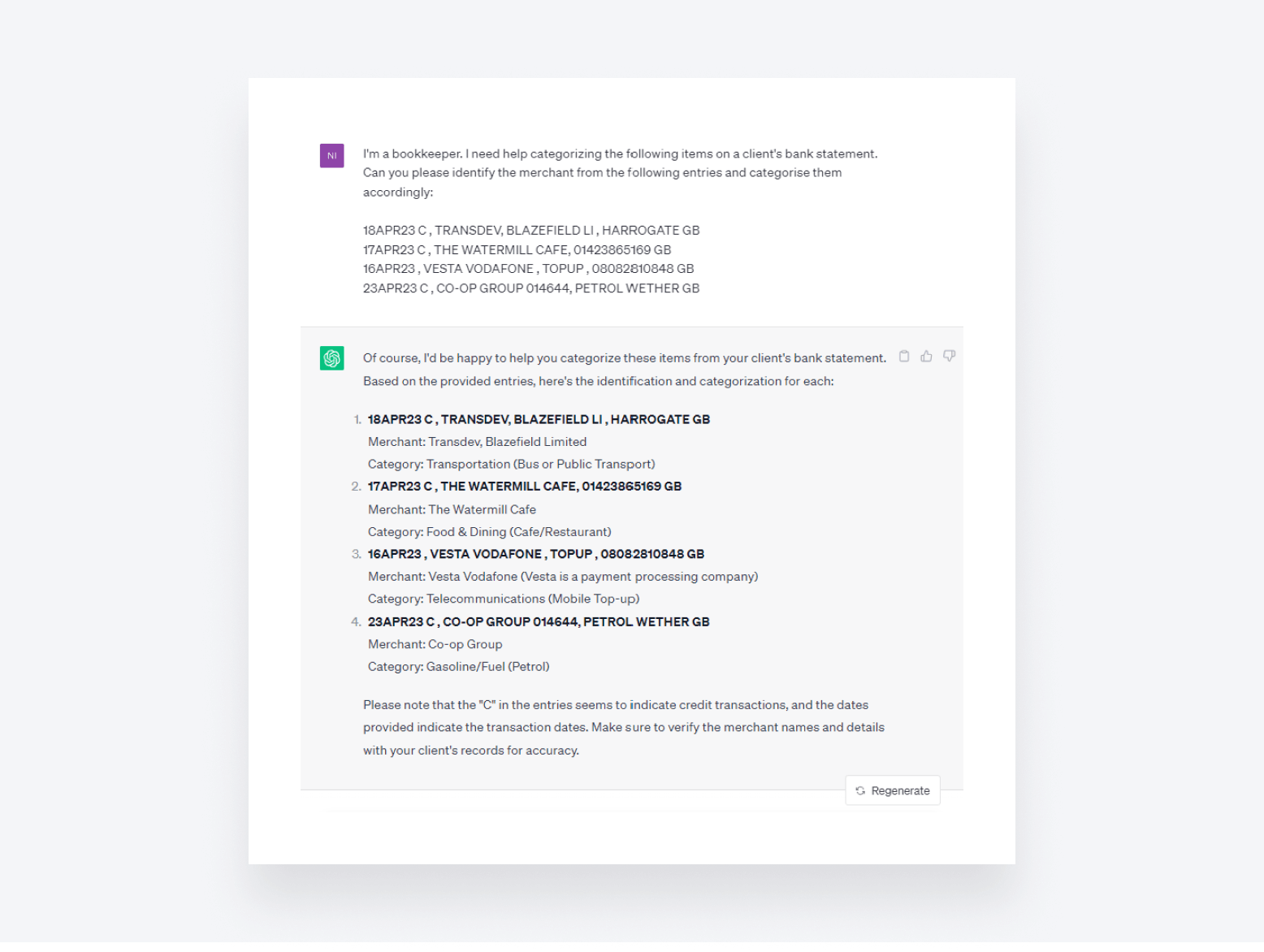
2. Tax return preparation
Tax returns are the bread and butter of business for many firms. But when tax season comes, the challenge is serving as many clients as possible with limited time and resources. ChatGPT can help in a number of ways, including:
- Clarifying tax terminology and concepts
- Creating tax preparation checklists to standardize the process
- Double-checking entries and calculations
- Drafting responses to IRS notices
- Guidance on tax deductions and credits
It’s worth noting that to gain access to real-time data, you’ll need to sign up for a paid version of ChatGPT. The free version is trained on outdated data, making it unreliable when it comes to the latest IRS deductions or regulations.
In the video below, Marc Howard explains in detail how ChatGPT can help process tax returns.
3. Client communications and support
Keeping clients in the loop is essential for any well-run accounting firm, but manually writing emails and answering questions can be a huge drain on resources. You can claw most of that time back by prompting ChatGPT to draft your client emails for you. For example, here’s a prompt you can use to create a welcome email template:
Create a welcome email template for new clients to our accounting firm, <Insight Company Name>. It should be polite and professional but also warm and welcoming. Please make it as short as possible — we don’t want to bore our new clients.
As you can see, ChatGPT comes up with a decent template in a matter of seconds:
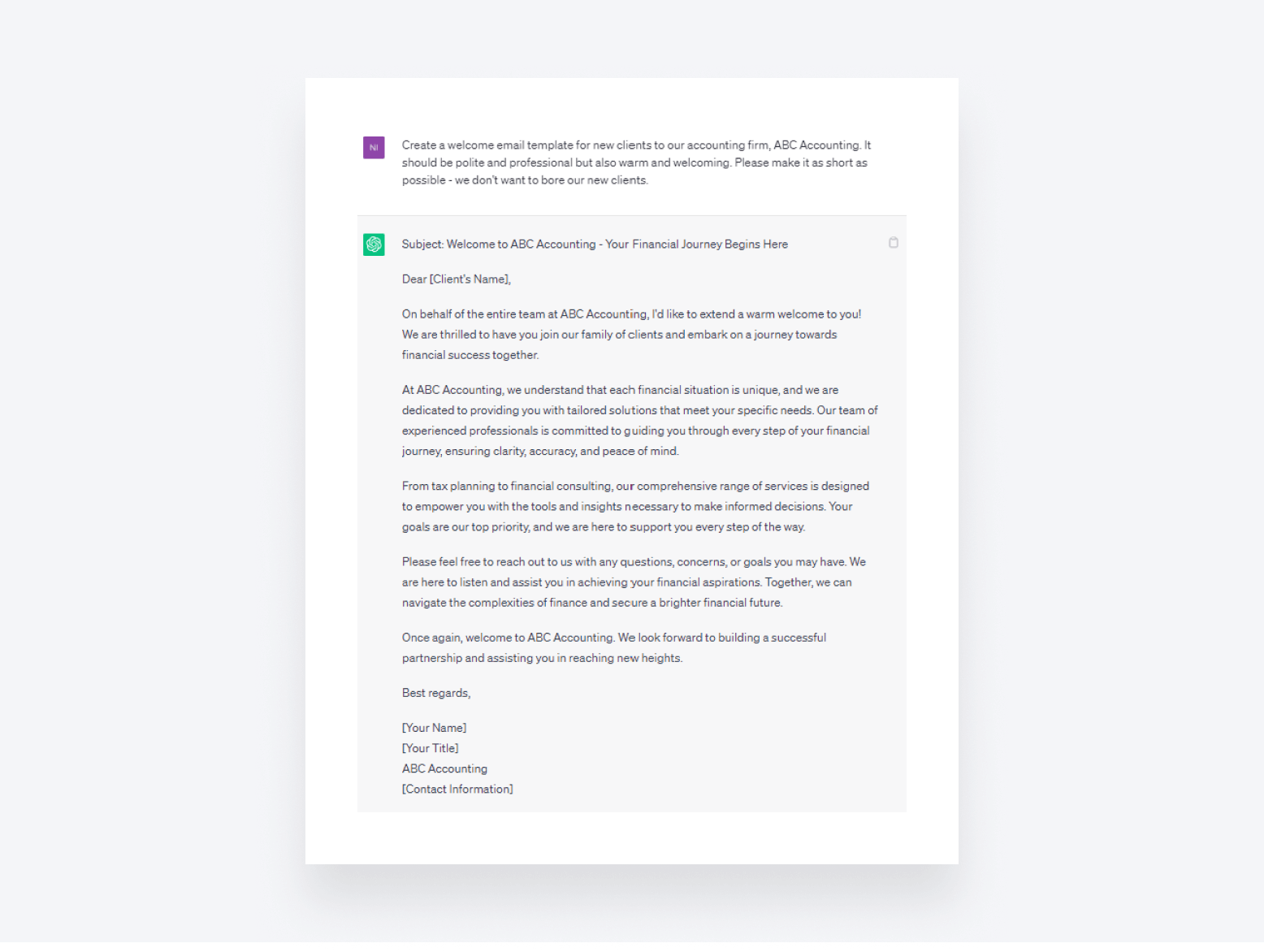
You can even build a ChatGPT-powered chatbot, using the ChatGPT API key. This way, you can engage visitors as they land on your website, answer their questions, and generate leads — all without you lifting a finger. Not bad, eh?
4. Financial reporting templates
Creating accurate and timely financial reports is an essential part of an accounting firm’s work. Without a way to automate and streamline this process, it can be needlessly time-consuming and fiddly. Once again, ChatGPT can help.
With the right prompts, ChatGPT can generate templates for financial reports, including balance sheets, income statements, and cash flow statements. Here’s a simple prompt for a cash flow statement template:
Can you create a simple cash flow statement template that I can use across all my accounting clients?
Let’s see what CharGPT came up with …
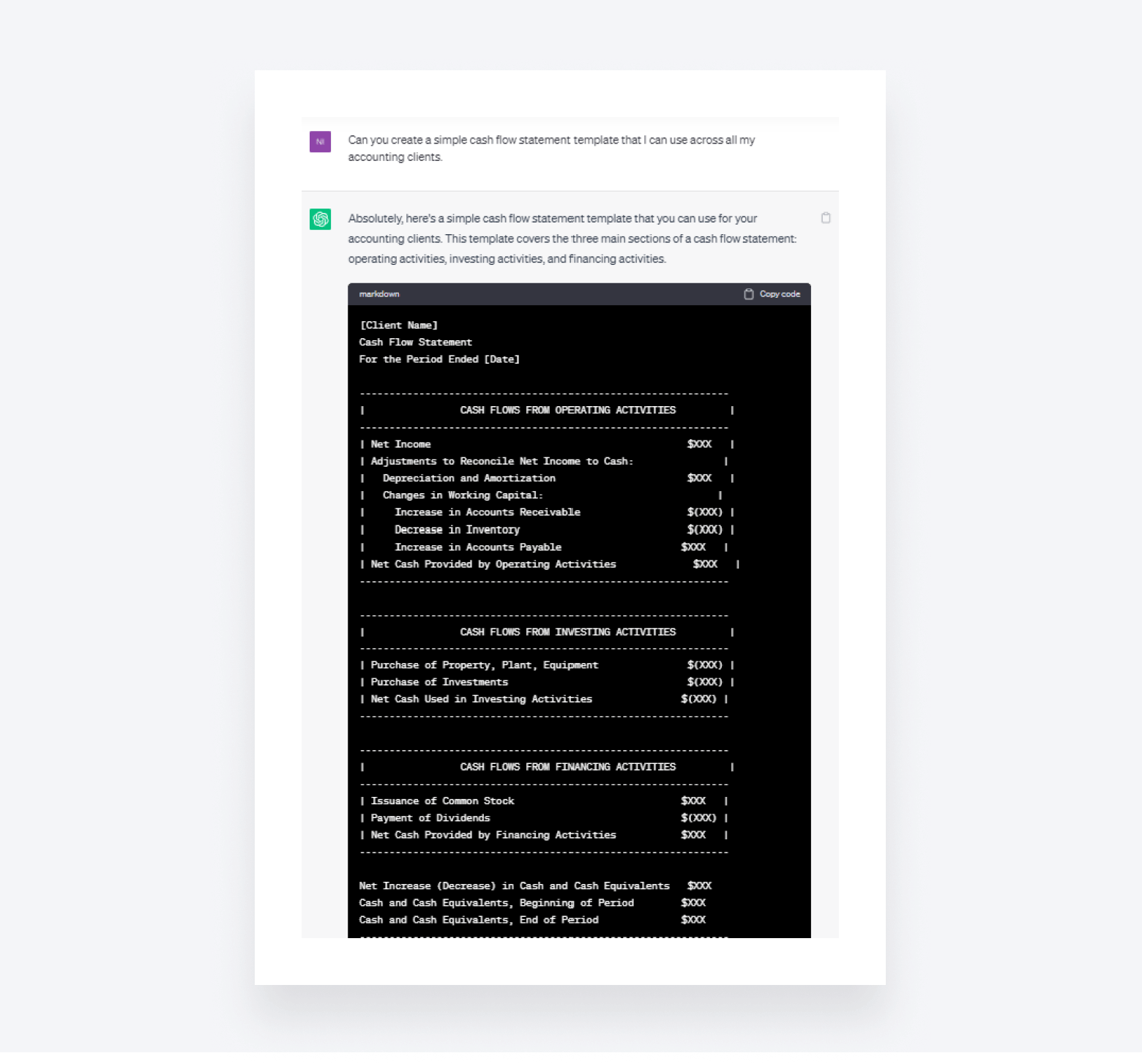
5. Data entry and formatting
What if you need to upload a client’s recent transactions to your accounting system, but all you have is a bunch of PDF bank statements? No problem, ChatGPT can help.
By copying and pasting the transaction data (with names and addresses removed, for security’s sake!) from the PDF to ChatGPT, you can prompt the AI to transform the data into CSV format. Then you just stick it in a spreadsheet, upload it to your accounting software, and away you go.
This process is explained in more detail in this video by popular accounting influencer Jason Staats.
6. Content creation
Content creation is one of the best examples of how to use ChatGPT for accounting. With some well-written prompts, you can get instant social media posts, blog articles, and even web copy. You may need to tweak them to your liking, but leveraging ChatGPT here could save you countless hours.
Below is an example of a prompt asking ChatGPT to generate three social posts to drive engagement in the run-up to tax season:
“We are an accounting firm that specialises in personal tax returns. Tax season is approaching, and we want to let people know that we can help process their tax returns promptly. Write three social media posts spreading the word. Each post should be just a few sentences each.”
As you can see, ChatGPT did a decent job of getting the style and tone right for social media:
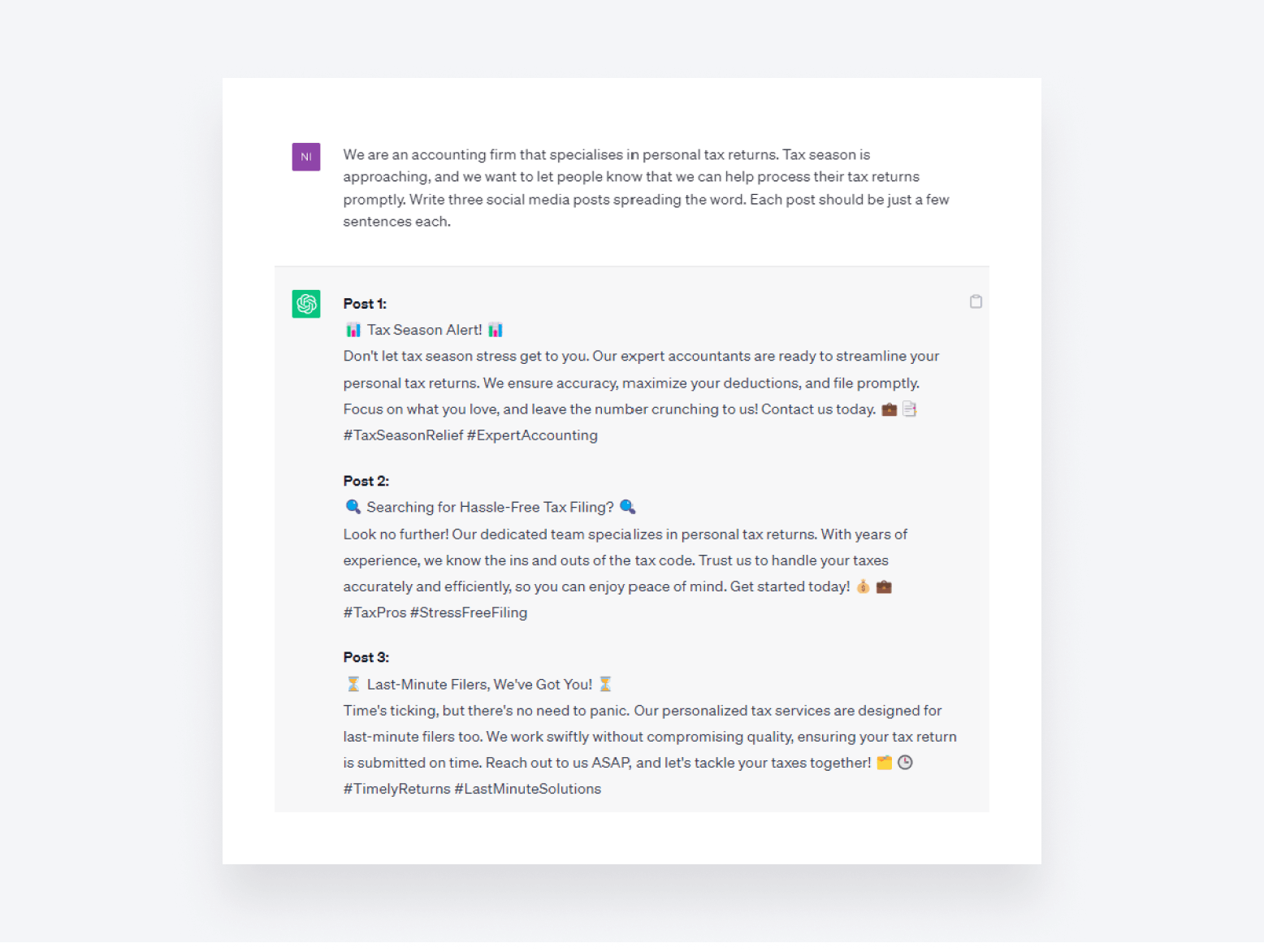
7. Question-answering service
Before ChatGPT, Google was most people’s go-to tool for getting answers to questions. But using Google often involves trawling through results to find the information you need.
With ChatGPT, you get the exact information you need straight away. And unlike Google, how that information is delivered to you depends on how you write your prompt. For example, using the following prompts, ChatGPT would describe forensic accounting in entirely different ways:
- Describe forensic accounting in detail
- Describe forensic accounting in just a few sentences
- Describe forensic accounting to me like I’m a ten-year-old child
Let’s take a look at one of the answers below. While this response would be of little use to an experienced accountant, it goes to show just how much your prompts can shape ChatGPT’s responses.
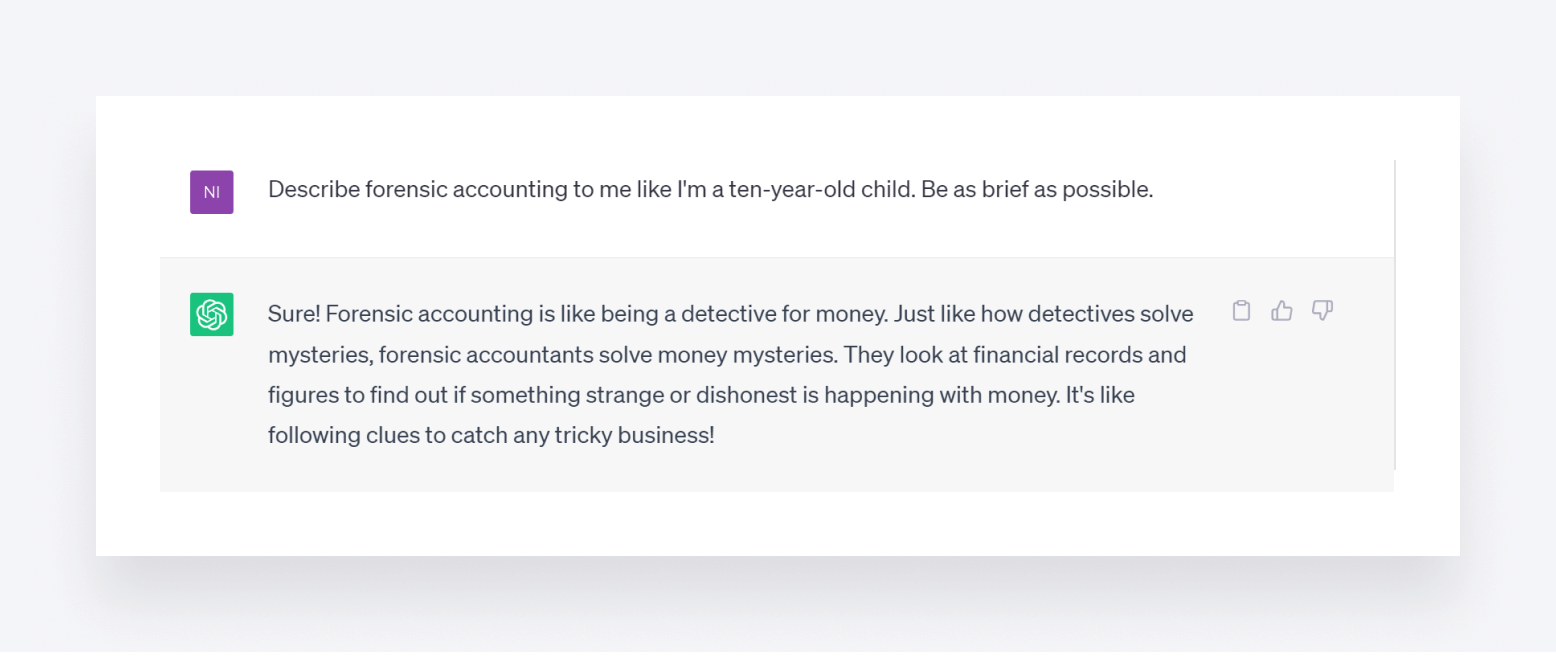
8. Marketing strategy
ChatGPT isn’t just useful for creating individual pieces of content. You can use it to create your entire marketing strategy. For bigger firms with in-house marketing teams, it can be used to augment human marketers and speed up processes. But for smaller firms, it can take the reins completely.
Below you’ll find an example of a ChatGPT-generated marketing strategy in response to the following prompt:
I’m a small accounting firm without a marketing team. We want to increase our online presence and drive more traffic to our website, allowing us to capture more leads. Please create a simple marketing plan that we can implement. Remember that we are not marketing experts and have little time to dedicate to marketing.
Here’s what ChatGPT came up with:
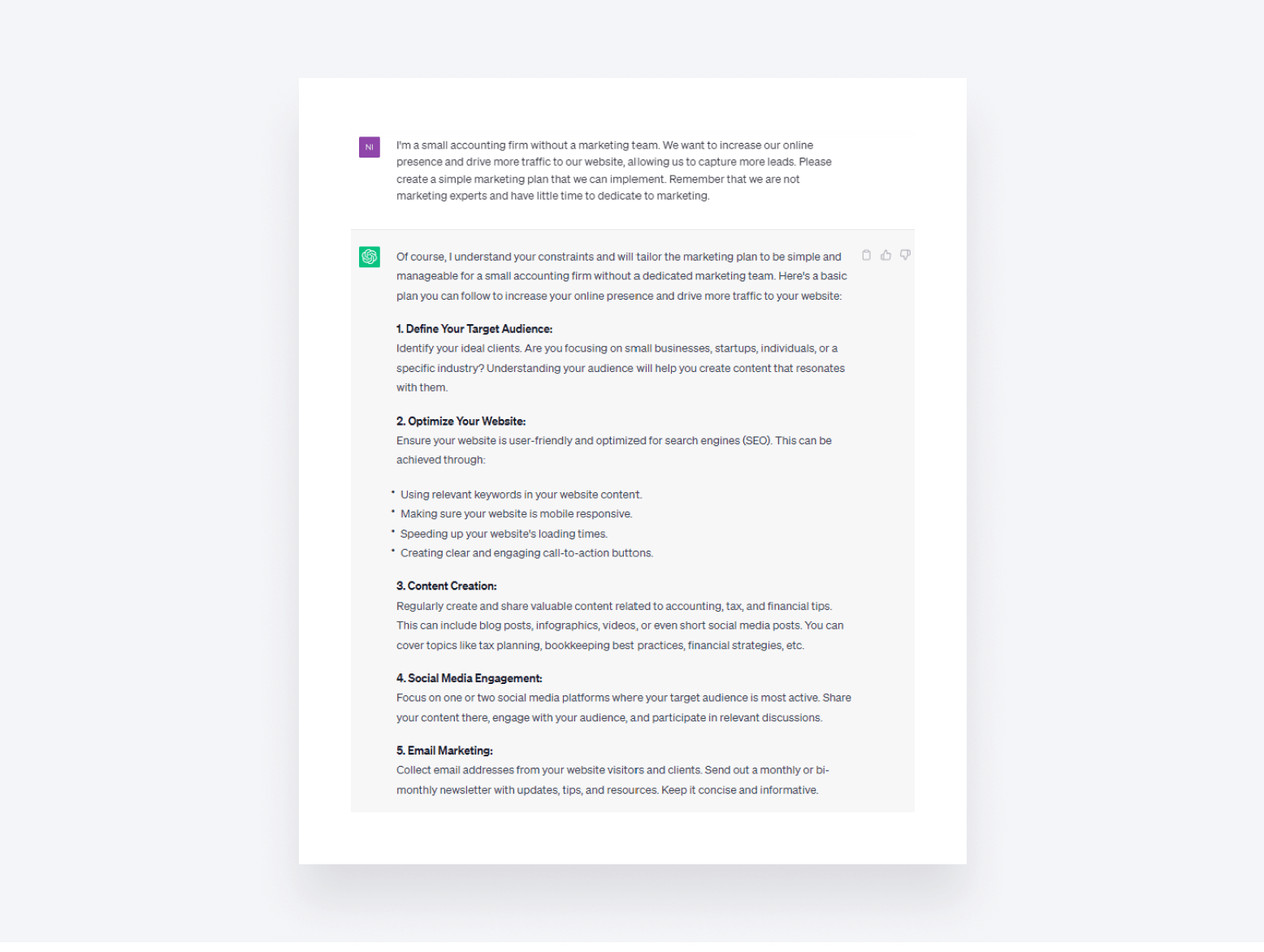
9. Learning and training
ChatGPT is also an excellent learning resource, especially for accounting students or junior accountants who are still learning their trade. Think of it as a virtual tutor, there to answer your questions, create learning materials, and test accountants’ knowledge. The possibilities are endless.
While ChatGPT might not grasp the latest tax or accounting standards, it’s great for general topics and fundamental knowledge.
We used the following prompt to create a quiz designed to test junior accountants’ basic knowledge:
I need to create some training materials for the junior accountants at my firm. Please create a short quiz, no longer than ten questions in total, on tax accounting. Each question should be multiple choice, with a total of three choices per question.
Here’s what ChatGPT gave us:
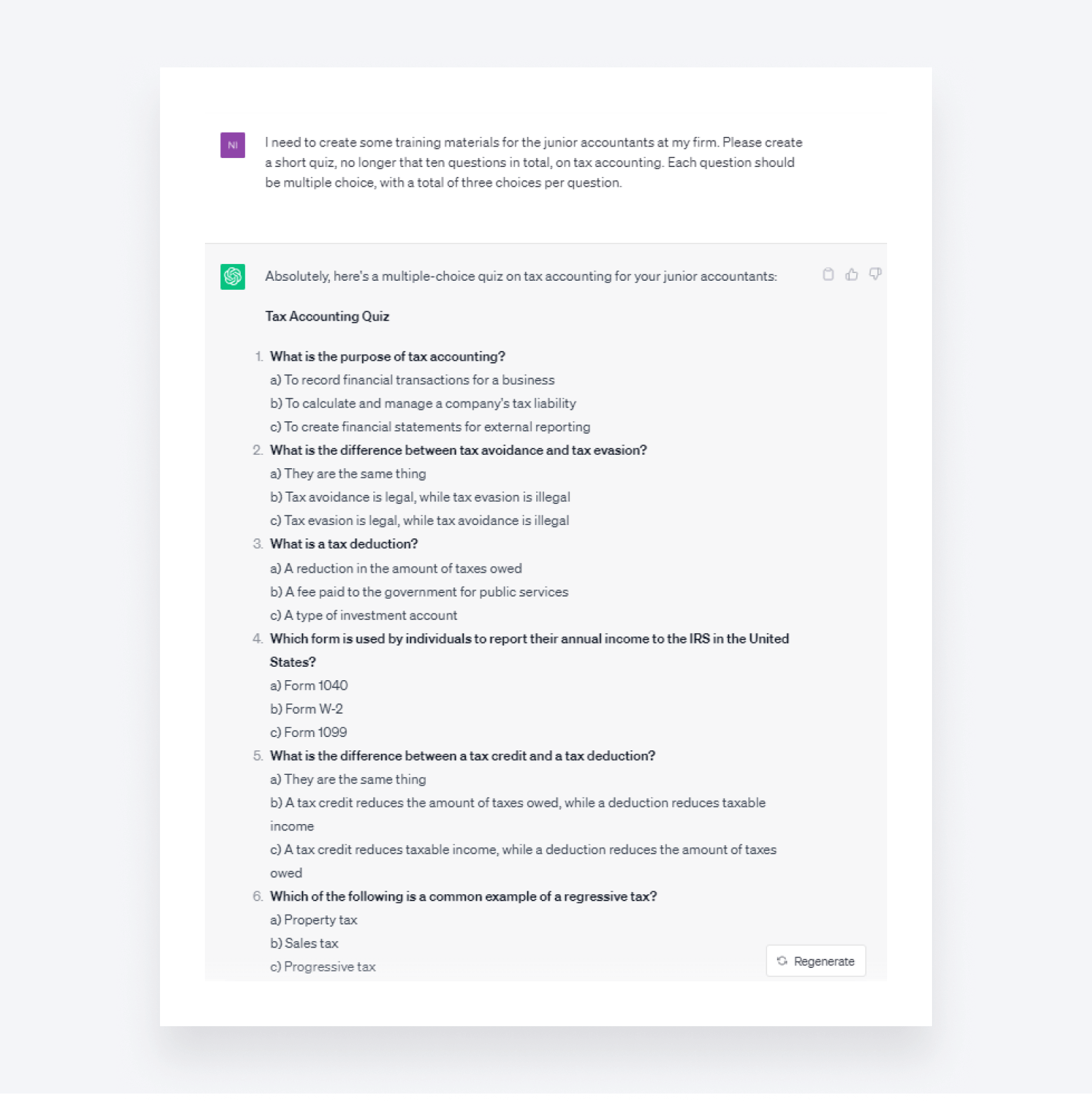
10. Fraud detection and risk assessment
Fraud detection is a complicated job to perform manually. Spotting discrepancies and anomalies amid vast amounts of data is like finding a needle in a haystack. But with a tool like ChatGPT, the potential to simplify this process is huge.
While this particular use case of ChatGPT for accounting is still to be fully explored, investment banking behemoth JPMorgan is currently developing a proprietary generative AI to detect fraud.
11. Create checklists
Accounting is all about processes. But to ensure accuracy and consistency across all clients, those processes must be standardized. Checklists are a great way to do this. ChatGPT can easily create all manner of process checklists in the blink of an eye. You may need to adjust them to your liking, but using ChatGPT in this case will save you tons of time.
Below is an example of a checklist we created using the following prompt:
Create a simple checklist that I can use when processing tax returns for my clients.
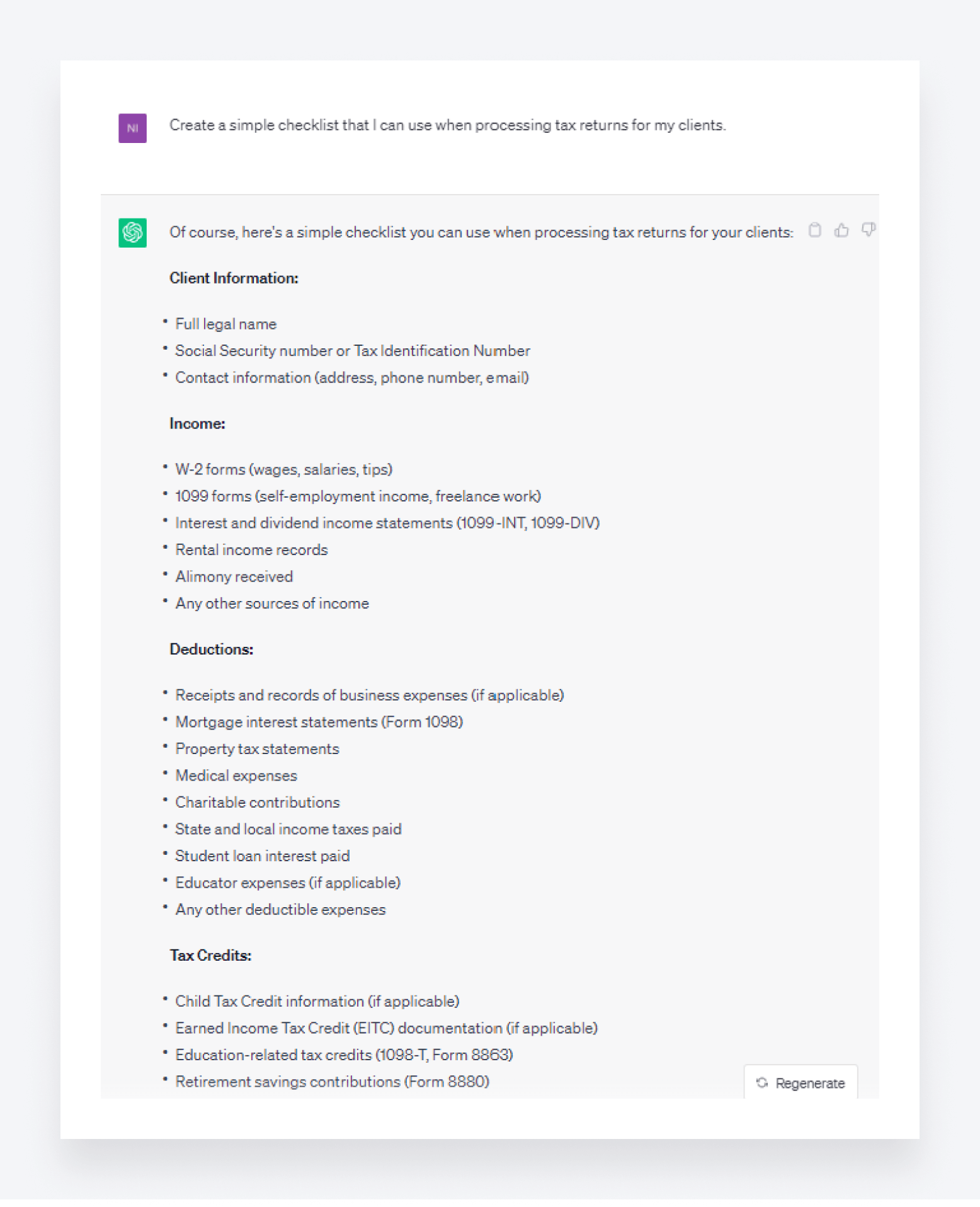
12. Client invoicing
While there are tons of tools for creating and sending invoices, none of the traditional software platforms allow you to create invoices using conversational prompts. Using ChatGPT plugins — tools designed to help ChatGPT access third-party services and up-to-date data — you can easily create invoices.
All you have to do is input the client details, your details, and the amounts to be paid, and ChatGPT does the rest. If something needs adjusting, there’s no need to manually edit the details yourself. You simply ask ChatGPT to do it for you.
Limitations of ChatGPT in accounting
ChatGPT offers numerous benefits and a broad scope, but it isn’t an effective tool for all your accounting tasks. To use it effectively, it’s important to understand its limitations. These include:
- Lack of industry-specific expertise. ChatGPT doesn’t always provide accurate advice for complex accounting regulations or niche financial scenarios, especially if you use a version trained on old data.
- Inability to perform real-time calculations. ChatGPT cannot process live data or calculations from accounting software. This limits its use for immediate financial analysis.
- No legal accountability. Any recommendations that ChatGPT provides are not legally binding and must be verified. Ultimately, you’ll be held responsible if its advice is poor or inaccurate.
- Limited understanding of local tax laws. ChatGPT is effective at explaining bigger-picture ideas. However, its knowledge may not span country- or state-specific tax regulations, especially recent updates or nuanced tax codes.
- Dependence on user input. The quality of ChatGPT’s responses depends heavily on the quality of the prompts. Give it unclear or incomplete inputs and you’ll get unclear or incomplete outputs.
- No integration with accounting tools. ChatGPT cannot directly interact with accounting software like QuickBooks, Xero, or TaxDome. This leads to disjointed workflows.
- Potential for outdated information. The free version of ChatGPT isn’t connected to the internet. This means its knowledge is based on outdated data.
- Inability to replace human judgment. ChatGPT cannot make complex ethical, strategic, or context-sensitive decisions. All of these require human expertise and judgment.
How TaxDome can replace ChatGPT in accounting work
While ChatGPT serves as a helpful assistant, TaxDome offers powered features tailored to the day-to-day needs of accounting professionals. Here are just some of the capabilities TaxDome offers that ChatGPT cannot:
- Workflow automation. TaxDome enables you to automate entire accounting workflows — from client onboarding to tax preparation. All repetitive tasks run on autopilot, including client communication, document collection, task management, invoicing, and more.
- AI-powered reporting. TaxDome houses all your firm’s data. With our reporting tool, you can turn this data into actionable insights about team performance, client value, and more. You can also quickly find specific insights using our AI-powered search tool.
- Seamless integrationt. TaxDome offers native integrations for leading accounting and tax platforms, payment providers, and schedulers. This enables you to create seamless workflows with TaxDome as your central hub.
- Team collaboration. TaxDome provides all the tools you need to organize work, with complete visibility into tasks, deadlines, and progress. You can assign work automatically, create standard operating procedures (SOPs), and set access rights with ease.
- Client portal. In addition to automated client communication, TaxDome provides a client portal and client mobile app. These provide a secure environment where clients can manage all touch points with your firm — from uploading and e-signing documents to communicating with accountants and paying bills.
Conclusion
Among a host of AI-powered tools now being used in everyday work, ChatGPT is a true pioneer. Its flexibility makes it an ideal tool for accountants looking to automate and streamline a broad range of processes. We’ve only just begun scratching the surface when it comes to ChaGPT for accountants. In the coming years, we could see it have a transformative impact.
We’ve highlighted some practical ChatGPT accounting ideas in this article. But when it comes to understanding its potential, first-hand experience is best. So have a play around with it, get a feel for how it works, and see for yourself the time it could save you.
To truly unlock efficiency across your firm, you need more than ChatGPT. With TaxDome, you have a suite of tools designed to streamline and automate your accounting workflows, all while providing an incredible client experience. To see for yourself, request a demo today.
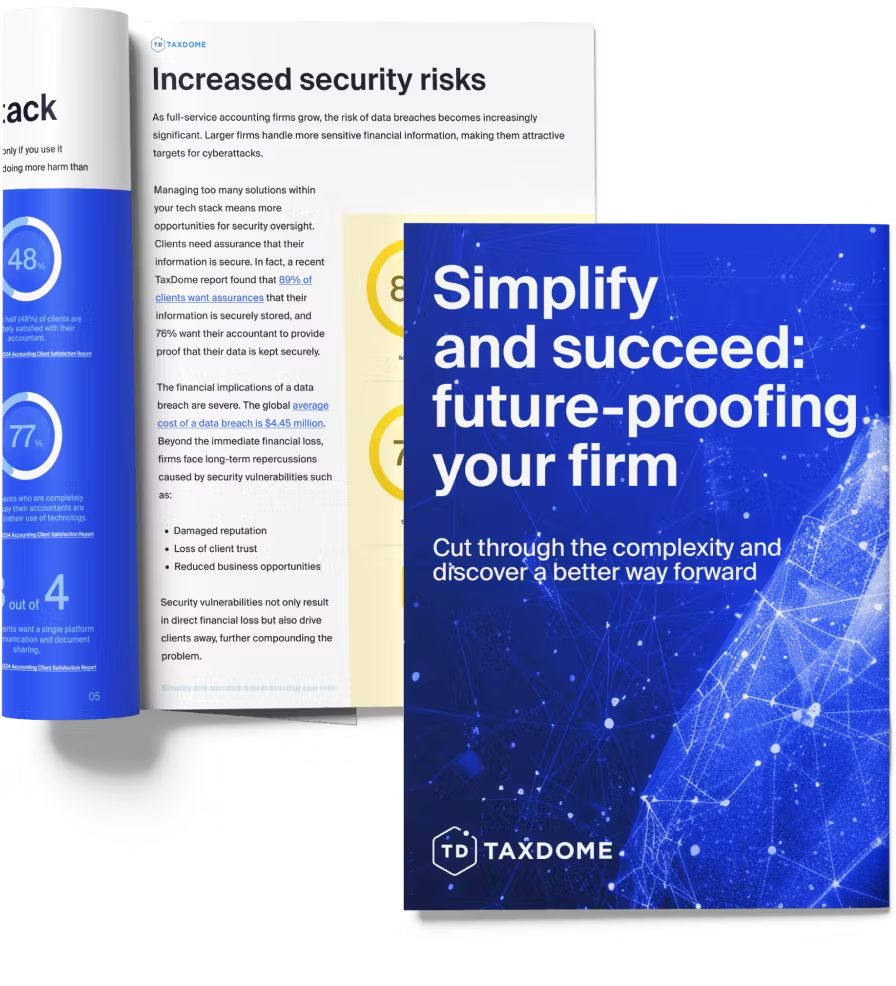
Thank you! The eBook has been sent to your email. Enjoy your copy.
There was an error processing your request. Please try again later.
What makes the best accounting firms thrive while others struggle to keep up? We analyzed our top 20 TaxDome firms, representing over $100M in combined revenue, to uncover the strategies driving their success.



